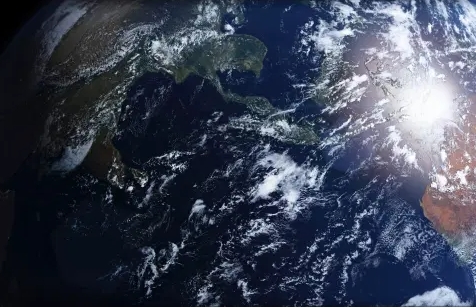Scientists investigate whether another civilisation lived on Earth BEFORE humans

SCIENTISTS are searching for signs of an extinct civilisation that pre-dates mankind.
What sounds like a wild conspiracy theory could hold the key to finding alien life and help us measure our impact on our planet, claim the boffs
The new study hinges on a warming period 56million years ago when global temperatures were around 8C higher than today – what’s known as the Paleocene-Eocene Thermal Maximum (PETM).
As a guide for what we might expect from ancient inhabitants, the authors looked at what our own civilisation may leave behind on Earth as signs of our existence – such as plastics in the ocean, evidence of fertiliser use, and (above all) evidence of fossil fuel use.
But don’t go expecting to stumble upon any massive structures, they claim, because there’s no way they would have remained preserved through tens of millions of years of geological activity.
“There is a conundrum here. If an earlier species’ industrial activity is short-lived, we might not be able to easily see it,” Professor Adam Frank of the University of Rochester writes in The Atlantic.
“The PETM’s spikes mostly show us the Earth’s timescales for responding to whatever caused it, not necessarily the timescale of the cause.
“In other words, if you’re not explicitly looking for it, you might not see it.”
The scientists concluded that there is no evidence of an earlier civilisation on Earth – but their ideas could extend to the search for alien life on other planets.
In this way, the new paper relates its theory for precursors to human civilisation to the Drake equation – a probabilistic approach to estimating the amount of intelligent extra-terrestrial life in the Milky Way – developed by astronomer Frank Drake.
One of the equation’s key variables is the length of time such an alien race can broadcast detectable signals across the galaxy for others to pick up.
A possible reason why we haven’t achieved contact with an alien species is that this “length of time” may be extremely short.
Take humans as as example – we’ve been kicking about for around 12,000 years but have only been able to send radio signals into space for about a century.
But it could also indicate that a technologically-advanced alien race capable of broadcasting its existence has a very short life span.
And our wasteful society has a lot to learn from that foreboding equation, claims the study’s co-author Gavin Schmidt, director of Nasa’s Goddard Institute for Space Studies.



 Creators of mankind
Creators of mankind Description of “Tall white aliens”
Description of “Tall white aliens” Where they came from?
Where they came from? About hostile civilizations
About hostile civilizations The war for the Earth
The war for the Earth “Tall white aliens” about eternal life
“Tall white aliens” about eternal life Video: “Nordic aliens”
Video: “Nordic aliens” Aliens
Aliens Alien encounters
Alien encounters The aliens base
The aliens base UFO
UFO Technology UFO
Technology UFO Underground civilization
Underground civilization Ancient alien artifacts
Ancient alien artifacts Military and UFO
Military and UFO Mysteries and hypotheses
Mysteries and hypotheses Scientific facts
Scientific facts


















